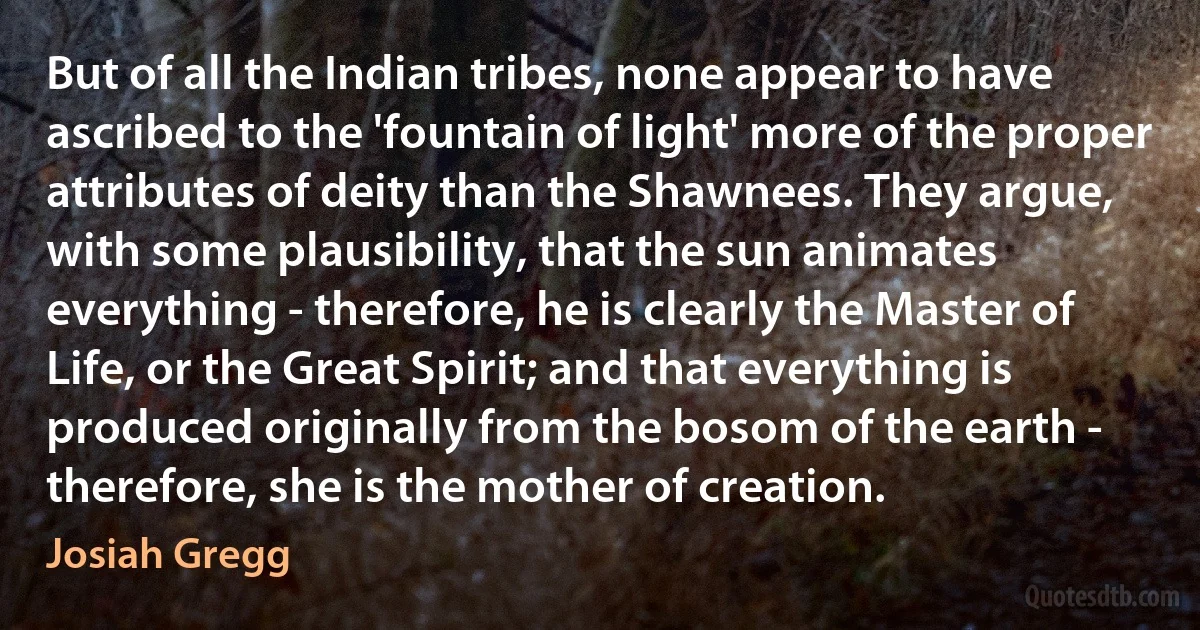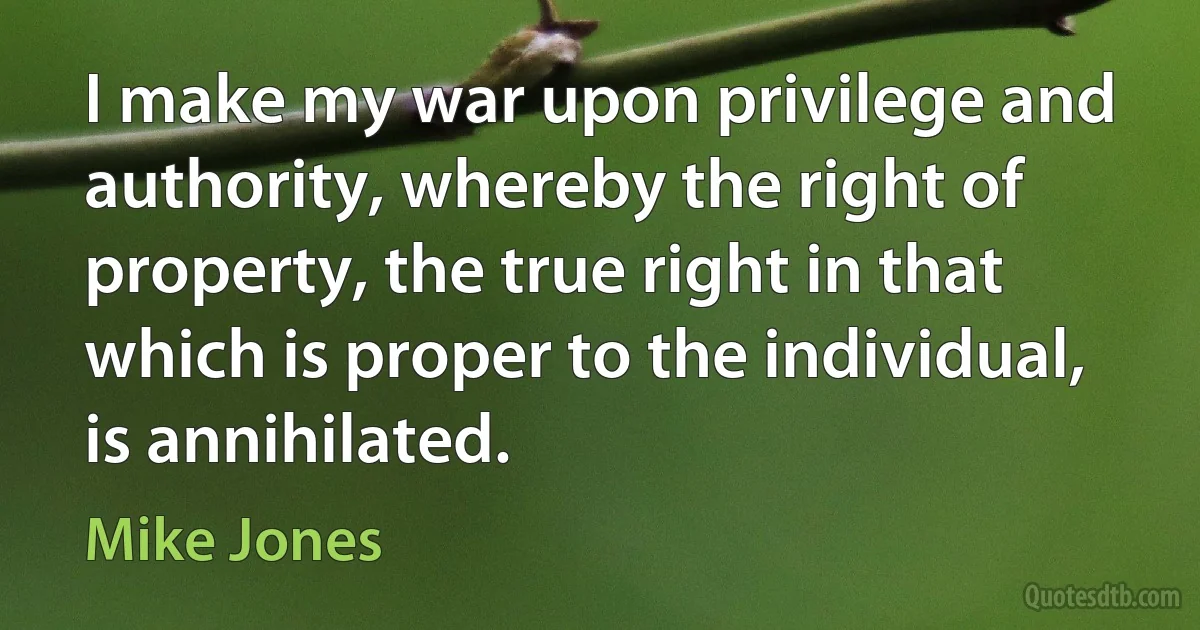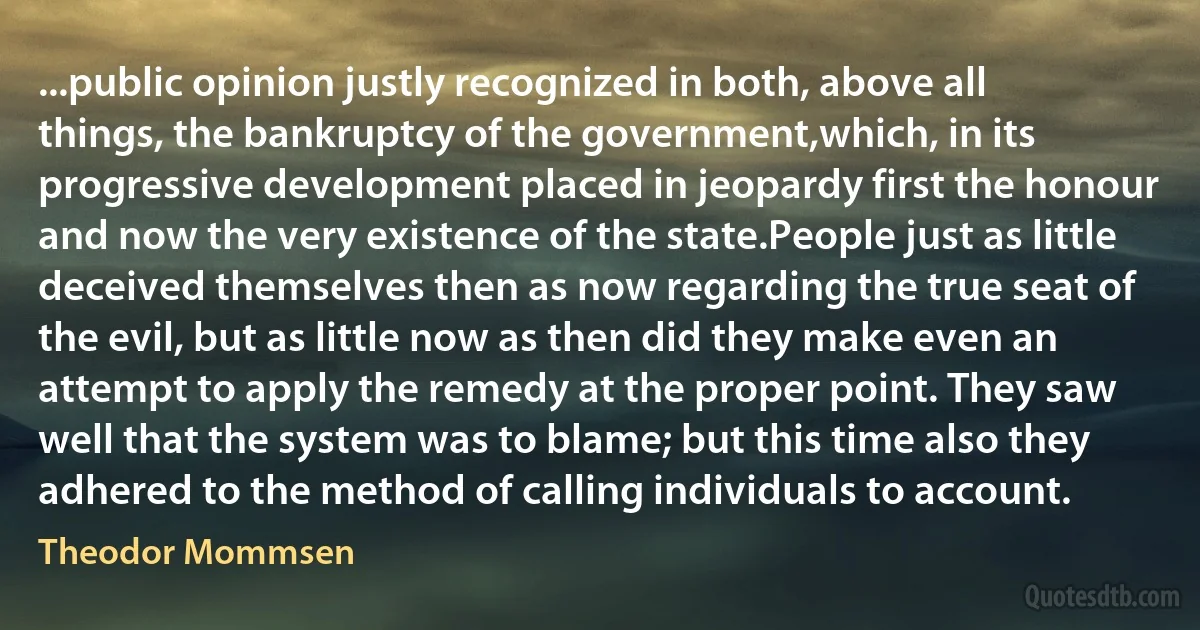Proper Quotes - page 56
That the Macedonians were of Greek stock seems certain. The claim made by the Argead dynasty to be of Argive descent may be no more than a generally accepted myth, but Macedonian proper names, such as Ptolemaios or Philippos, are good Greek names, and the names of the Macedonian months, although differed from those of Athens or Sparta, were also Greek. The language spoken by the Macedonians, which Greeks of the classical period found unintelligible, appears to have been a primitive north-west Greek dialect, much influenced by the languages of the neighboring barbarians.

J.R. Hamilton
Here we are at the antipode of automatism [invention from Surrealism] and mechanism, and no less distant from the cunning way of reason. In the action of the machine, in which everything is repeated and predetermined, accident is an abrupt negation.. .. [the] excess of ink flowing capriciously in thin black rivulets.. ..this line deflected by a sudden jar, this drop of water diluting a contour – all these are the sudden invasion of the unexpected in a world where it has a right to its proper place. [Motherwell is quoting here the comments of w:Henri Focillon on Japanese legends of 'accidentalism'].

Robert Motherwell
I cannot keep silent, nor would it be proper, so many favours and graces has the Lord deigned to bestow on me in the land of my captivity. For after chastisement from God, and recognizing him, our way to repay him is to exalt him and confess his wonders before every nation under heaven.

Saint Patrick
Unfortunately for all of them, the Archaeological Survey of India (2003) and the Allahabad High Court (2010) reconfirmed the old consensus: of course, a Hindu temple had stood at the site and had been forced to make way for the mosque. So, all these Leftist efforts to impose a rewritten version of history had been in vain. Moreover, in her recent book Rama and Ayodhya, Meenakshi Jain has documented what a sorry figure these supposed "experts” have cut when they were questioned in court during the Ayodhya proceedings. One after another was forced to admit that he didn't really know, that he hadn't been to the site though pontificating on its archaeology, that is was all just a hypothesis. So, those were the people who had been cited as authority by all the politicians, journalists and India-watchers. If the truth of their politically motivated deception is given proper publicity, their game will be over. (Ch. 16)

Koenraad Elst
"I choose my physician and my clergyman, thus indicating my sense of the quality of their work.” By all means, also, choose your bricklayer; that is the proper reward of the good workman, to be "chosen.” The natural and right system respecting all labour is, that it should be paid at a fixed rate, but the good workman employed, and the bad workman unemployed. The false, unnatural, and destructive system is when the bad workman is allowed to offer his work at half-price, and either take the place of the good, or force him by his competition to work for an inadequate sum.

John Ruskin
A proper understanding of biology and culture both affirms the great important of biology in human behavior and also explains why biology makes us free. The old equation of biology with restriction, with the inherent (as opposed to the malleable) side of the false dichotomy between nature and nurture, rests upon errors of thinking as old as Western culture itself. The critics of biological determinism do not uphold the equally fallacious (and equally cruel and restrictive) view that human culture cancels biology. Biological determinism has limited the lives of millions by misidentifying their socioeconomic disadvantages as inborn deficiencies, but cultural determinism can be just as cruel in attributing severe congenital diseases, autism for example, to psychobabble about too much parental love, or too little.

Stephen Jay Gould
In randori we learn to employ the principle of maximum efficiency even when we could easily overpower an opponent. Indeed, it is much more impressive to beat an opponent with proper technique than with brute force. This lesson is equally applicable in daily life: the student realized persuasion backed up by sound logic is ultimately more effective than coercion.

Jigoro Kano
It is a fundamental quantum doctrine that a measurement does not, in general, reveal a pre-existing value of the measured property. On the contrary, the outcome of a measurement is brought into being by the act of measurement itself, a joint manifestation of the state of the probed system and the probing apparatus. Precisely how the particular result of an individual measurement is brought into being-Heisenberg's "transition from the possible to the actual"-is inherently unknowable. Only the statistical distribution of many such encounters is a proper matter for scientific inquiry.

David Mermin
These are the times that try men's souls. The Summer soldier and the sunshine patriot will, in this crisis, shrink from the service of their country, but he that stands it now deserves the love and thanks of man and woman. Tyranny, like Hell, is not easily conquered; yet we have this consolation with us, that the harder the conflict the more glorious the triumph. What we obtain too cheaply we esteem too lightly; it is dearness only that gives everything its value. Heaven knows how to put a proper price upon its goods; and it would be strange indeed if so celestial an article as freedom should not be highly rated.

Mike Jones
Lewis was an Orientalist before Edward Said made that a term of abuse. Said was not a scholar of the Middle East, but a polemicist from the Middle East. He was also an intellectual impostor. Ever since Orientalism came out in 1978, proper historians have concluded that it would be a masterpiece, if only it were true. The only people who take Edward Said's books seriously are, in no particular order of irrelevance, academic poseurs, chippy lefties, and the legions of chippy academic lefty poseurs churned out by the departments of Middle Eastern Studies.

Edward Said
The hardest part of being a clown, it seems to me, would be that you are constantly referred to as a clown. [...] How do you even know that you want to be a clown? I guess you just get to a point where your pants look so bad it's actually easier to become a clown than to have the proper alterations done.

Jerry Seinfeld
There are many creeds but only one faith. Creeds may change, develop, and grow flat, while the substance of faith remains the same in all ages. The overgrowth of creed may bring about the disintegration of that substance. The proper relation is a minimum of creed and a maximum of faith.

Abraham Joshua Heschel
I guess you could say that I was somewhat withdrawn from my classmates. I spent a good deal of time being a loner. I suppose that had something to do with the way we lived - always on the move, never living in one town very long. It's very hard to make lasting friendships that way. And my father was rather strict with me and my two younger sisters. He insisted on proper behaviour and very often vetoed our choices of boyfriends. There was always a curfew whenever my sisters or I would go out on a date - we had to be home on time or else. But I never resented his authority. In fact, I'm thankful for my strict upbringing; I feel it has helped me learn discipline - and that's very important in this business.

Sharon Tate
Because the peculiarity of man is that his machinery for reaction on external things has involved an imaginative transcript of these things, which is preserved and suspended in his fancy; and the interest and beauty of this inward landscape, rather than any fortunes that may await his body in the outer world, constitute his proper happiness. By their mind, its scope, quality, and temper, we estimate men, for by the mind only do we exist as men, and are more than so many storage-batteries for material energy. Let us therefore be frankly human. Let us be content to live in the mind.

George Santayana
Some persons, I know, entertain a notion that the proper way to educate a young man of 18 is to put before him all the arguments and systems of belief which ever have been or can be devised, and let him take his choice; but I am quite convinced that no such notion will ever commend itself to the general mass of parents in this country. They are well aware that thorny questions of controversy are not fit for men of unripe and unpractised minds, and that the only effect of asking them to choose impartially between all beliefs is to make them think that no belief is of much importance, and that at an age when temptations are strongest they may come to the conclusion that the moral maxims which rest on belief and belief alone are mere ancient and valueless superstitions.

Robert Gascoyne-Cecil, 3rd Marquess of Salisbury
All the tasks are in themselves small, but each one has to be carried out at its proper hour, and the day has far more tasks than hours. That is well; one would not want it to be different. But if we ever think, between classroom, archives, secretariat, consulting room, meetings, and official journeys - if we ever think of the freedom we possessed and have lost, the freedom for self-chosen tasks, for unlimited, far-flung studies, we may well feel the greatest yearning for those days, and imagine that if we ever had such freedom again we would fully enjoy its pleasures and potentialities.

Hermann Hesse
Today, grave dangers attend the process of hastening withdrawal, and the legal safeguards will require most careful working out, and even then grave and serious issues might develop. But some hastening of the processes of death is in order and must be worked out. Primarily, however, the will-to-die of the patient is not based at this time on knowledge and on mental polarisation, or upon an achieved continuity of consciousness, but on emotional reactions and a shrinking from pain and from fear. Where, however, there is terrible suffering and absolutely no hope of real help or of recovery, and where the patient is willing (or if too ill, the family is willing), then, under proper safeguards, something should be done. But this arranging of the time to go will not be based on emotion and upon compassion, but on the spiritual sciences and upon a right understanding of the spiritual possibilities of death.

Alice Bailey
God willing we shall be able to impose the coming peace upon our enemies, which we must do. They will only sue for peace when they have been beaten so badly that they have had enough. Once they admit to that they will have to accept a peace which takes into account the new and heavy loss of blood suffered by the German people solely as a result of their pigheadedness. The peace must – if needs be at their expense and without regard for their feelings in the future – contain such real guarantees for us that a world combination such as the present one can never again be successfully put together against us. That is to say a genuine, proper, common-or-garden peace of the kind that has so far always been signed after a victorious war. There is no place in such a peace for dreams of human happiness or humanitarian cosmopolitanism, only one's own naked self-interest and the guarantee of one's own security and greatness must count. The vanquished must submit to his fate!

Wilhelm II of Germany
As Dr. Black had never anything for ostentation, he was at all times precisely what the occasion required, and no more. Never did anyone see Dr. Black hurried at one time to recover matter which had been improperly neglected on a former occasion. Everything being done in its proper season and place, he ever seemed to have leisure in store; and he was ready to receive his friend or acquaintance, and to take his part with cheerfulness in any conversation that occurred.

Joseph Black



